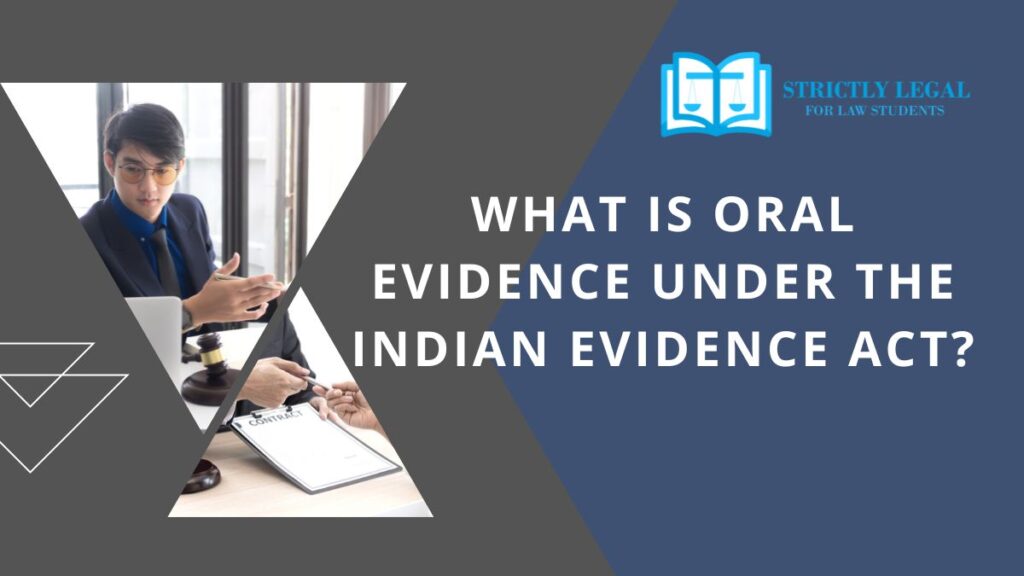Evidence holds an important role and holds under any court proceedings. Evidence is a definite and genuine and pertinent set of facts which proves or passes up for proving any matter, there is a prescribed manner in which the cycle of evidence works which has been divided into two main heads- Oral and Documentary evidence by the Evidence Act, 1872. Oral Evidence has been mentioned in u/s 59 and 60 of the Evidence Act, 1872, being defined u/s 3 which states that “All statements which the court permits or requires to be made before it by witnesses, in relation to matters of fact under inquiry, such statements are called as oral evidence.” The term “oral” itself describes its nature as expressed or spoken by mouth; hence anything that is accepted in the court with regards to the inquiry and expressed by any witnesses who are called in the trial is termed as oral evidence. Oral Evidence also takes into cognizance the statements that are made by people in signs and writing forms. Oral Evidence has been growing with the passing years as earlier it was not considered to be explicit as forthright as documentary, nonetheless its need and necessity have been increasing rapidly.
Table of Contents
Proof of Facts by Oral Evidence
As per section 59 of the Evidence Act, 1872 all the facts and circumstances may be proved by oral evidence by expressing or speaking except the contents of the documents and electronic records. The contents of the documents and the electronic records cannot be proved by oral evidence. It is contended that if any person has to prove the contents of a document or an electronic record then that type of a document becomes oral evidence and the documentary evidence loses its significance. In the case of Bhima Tima Dhotre v. The Pioneer Chemical Co., it was contended that the Documentary Evidence becomes vague if the writer of the same has to be called to prove the facts of the contents. If that were the situation, it would portray that the final analysis is that all evidence must be oral and that oral evidence would virtually be the only type of evidence that would be recognized by law. This provision would make it clear that to prove the contents of a document via means of oral evidence, it would be a violation of that section.
Oral Evidence must be direct
If any oral evidence needs to be admissible in the Court of Law, all the conditions that are mentioned u/s 60 of the Evidence Act, 1872 are to be fulfilled. This is the fundamental principle of any evidence to be admissible in the Court of Law. If any of the conditions mentioned u/s 60 of the act is not fulfilled, then the evidence will refrain from getting visualized as a piece of oral evidence. The basic and certain principle on which the ground of Section 60 is incorporated is with the simple concept that the evidence being taken into consideration must be direct. Indirect shreds of evidence or hearsay evidence are not considered a part of direct oral evidence. The term “direct” in all matters states that it is administered by any person on their own.
What is Hearsay Evidence?
Hearsay is basically an information that is received by any person from any other source. Hearsay means when a person does not have a personal prior knowledge about a specific matter or incident and he has been informed about that specific matter by someone else. But as we know, oral evidence involves first-hand knowledge, hearsay evidence is thus excluded under the purview of oral evidence as hearsay is not a directly obtained evidence.
Section 33 as an exception to Section 60
Section 33 of the Evidence Act, 1872 gives a structure of exceptions to section 60 having specific exceptions against the rule of hearsay as follows:
- Res-gestae is derived from a Latin Word which portrays something that is taken on purpose or done.
- Admission or confession
- For any reason if the person cannot come to the court if he is dead or cannot be found, is incapable of coming to the court, every such information which has been passed to another person, by the one who had to come at first, and that person giving the attestation in the court shall be admissible.
Difference between Oral and Documentary Evidence
| Oral Evidence | Documentary Evidence |
| The evidence where the witnesses are called to the court of law with regards to the orally state the facts as an evidence. | The evidence which is submitted in the court of law in the form of the written form including documents, papers etc. |
| Mentioned u/s 59 and 60 of the Evidence Act, 1872. | Dealt from section 61 to section 66 of the Evidence Act, 1872. |
| Should be given in direct form. | Has direct and secondary documents. |
| Can be given through speech, signs or gestures. | Must be given in writing. |
In State v. Rajal Anand, it was contended that Section 60 of the Evidence Act is only inclusive of the term ‘direct’ and excludes hearsay. Any evidence so given has to be direct and however hearsay evidence does not fall into the ambit of ‘direct’ evidence. But the doctrine of Res-gestae has been marked as an exception to the rule of hearsay which described that any person who has experienced any series of relevant facts, his testimony after the incident even if he has not seen the crime being committed, will be accepted.
In Amar Singh v. Chhaju Singh and Anr., a relationship between Section 50 and 60 of the Evidence Act, 1872, has been incorporated which clarifies that to provide and evidence entirely, two things shall be fulfilled- at first, there shall be a presence of relevant facts and those facts have been presented directly by the person who has either seen them, heard them or otherwise.
Conclusion
After having known about the concept of oral evidence, it can be said that oral evidence with its increasing approach can be appropriate and apt for passing a judgement if that is proven beyond a reasonable doubt. Irrespective of how it was taken during the earlier times, its needs have risen with the span of time.

Law student.
Turning legal insights into engaging narratives.




